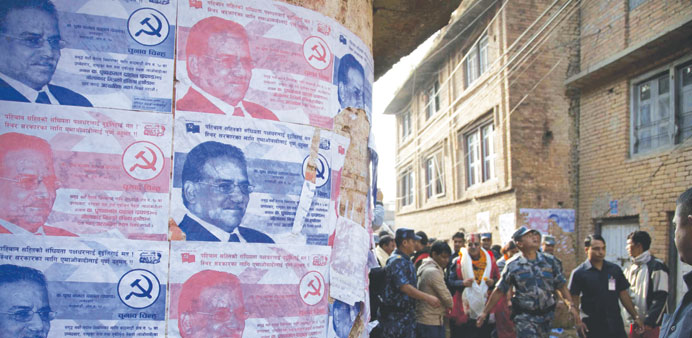|
P |
Protests and logistical challenges are heightening tensions before a scheduled November 19 national poll in Nepal that is seen as critical to the country’s stability and development, say analysts.
Voters are to choose a new constituent assembly (CA), which serves as the country’s parliament. The last assembly dissolved in May 2012 after failing to produce a much-anticipated post-war constitution. Citizens have looked to a new constitution to help the country emerge from the 1996-2006 civil war that killed more than 15,000 people. But the contentious issues that stalled its drafting, including how to structure the state and share power,
remain unresolved.
Of the approximately 16mn eligible voters, 12.5mn were registered, “potentially leaving a significant section of the population disenfranchised in the next election,” warned the Carter Center, a US-headquartered human rights organisation.
The election commission’s goal was to sign up 14.7mn voters. The Carter Center attributed this missed target to low turnout at voter registration drives, noting that undocumented residents could have been excluded despite government-initiated citizenship campaigns.
As campaigning rolls out nationwide, an opposition alliance has attempted to obstruct election-related activities, threatening to prolong the country’s political instability.
“The failure to write a constitution and the subsequent legislative vacuum in Nepal have contributed to the steady and continued erosion of the rule of law in the country, stalling development and choking off access to justice for Nepalis,” said Benjamin Schonveld, South Asia director of the International Commission of Jurists (ICJ)
office in Kathmandu.
The government has deployed nearly two-thirds of the army to provide security during the polls - the first time the army has participated in electoral security since fighting ended.
In several incidents, activists have disrupted election preparation activities by smashing computers and seizing records , according to local press reports, sparking concern that unrest will increase as the poll date
approaches.
While most anti-election activities took place in rural areas, the attacks spread to the capital in late October, when candidates’ cars were torched. With just 17 days before the election, experts say tensions over the very idea of holding polls may be enough to incite violence.
“..the way that the parties are projecting messages from different sides, it seems as if we’re going into a war rather than an election, which is troublesome..”
“Elections are civilian affairs conducted to manage conflict in a society,” said Bhojraj Pokhrel, the now-retired chief election commissioner who oversaw the country’s first national post-conflict poll in 2008, which elected the recently dissolved constituent assembly.
“But the way that the parties are projecting messages from different sides, it seems as if we’re going into a war rather than an election, which is
troublesome,” he added.
The country’s 240-year monarchy, which Maoist rebels had been fighting in the decade-long conflict, ended with the 2008 national election.
The 601-member CA established in that election was dubbed by the UN’s top official in the country as “Nepal’s most representative elected body to date”. Women won 33% of the seats, with 39 elected legislators (both men and women) coming from the Dalit community, the marginalised, historically lowest caste in the country.
The assembly’s principle mission was to draft a new constitution, but after four extensions of its deadline, it failed to do so. It dissolved in May 2012, leaving in place a caretaker government led by Maoist Prime Minister Baburam Bhattarai.
Shortly after the dissolution, a breakaway party led by Mohan Baidya split from the mainstream Maoists, accusing party leaders of surrendering too much during the peace process, including disbanding the People’s
Liberation Army.
Unable to forge consensus on when to hold elections for a new constitution-drafting body, Bhattarai stepped down in March 2013 and, in a controversial move, Supreme Court Chief Justice Khilraj Regmi became the head of government.
Regmi, with the support of the four major political parties, announced a November 19 poll date, leading the Communist Party of Nepal (CPN)-Maoist breakaway party, with an alliance of 33 small parties, to protest the election.
The protesters damaged voter registration equipment and burned copies of the election code of conduct, demanding that polls be called through political consensus. The CPN-Maoists also demanded Regmi’s
resignation.
Fifty-six national and international organisations are registered to observe the election. They will deploy upwards of 74,000 poll observers - nearly all Nepali nationals - nationwide. According to officials, ballot printing is underway, and initial concerns about printing voter ID cards have been resolved.
“We’re confident we will find a solution [to voter ID distribution issues], and we are fully committed to the November 19 date,” election commission spokesman Bir Bahadur Rai told IRIN. While the government promises all voter ID documents will be distributed one week before polls, the Carter Center has expressed concerns about the “low level” of voter education nationwide, covering everything from where to obtain voter ID cards to where and how to vote.
Meanwhile, opposition to the election preparation processes has mounted.
According to a September UN report, the CPN-Maoists and their allies are conducting door-to-door campaigns “to dissuade people from participating in the CA elections,” recruiting “youth squads” to burn copies of the election code and enforcing local transportation strikes.
Cadres of the two Maoist parties have clashed, violently in some cases, according to local media.
An opposition 33-party alliance has promised to hold a 10-day nationwide transportation strike in the lead-up the November 19 poll.

